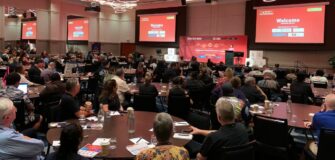In 2016 thousands of Syrian and Iraqi people fled their homes in face of the rise of Islamic State and a brutal civil war in Syria.
Some of these refugees ended up in Australia, including an extra one-off humanitarian intake of 12,000 people who were particularly vulnerable because of their faith or ethnicity.
A recent study conducted by academics at the University of Technology Sydney and Western Sydney University, supported by researchers from my organisation AMES Australia, looked at the settlement and wellbeing outcomes these people have experienced since arriving.
It found the Syrians and Iraqis are overwhelmingly happy to be living here, want to become citizens and are optimistic about the future.
The research found 90 per cent refugee families are happy to be living in Australia, 98 per cent say it is a good place to bring up children and 76 per cent said it was easy to make friends.
More than 90 per cent of the refugees said their neighbourhood was a safe place to live and found their neighbours friendly.
About three quarters said they found it easy to make friends and more than half had found work in their respective fields.
Young people, especially, experienced positive settlement outcomes, with high levels belonging, confidence and aspiration for the future.
These positive results are no accident.
Australia has a generous and sophisticated humanitarian settlement system that we working in the sector see as a smart investment.
We have a flexible and well-resourced program that allows fir the needs, barriers and aspirations of individual refugees to be addressed.
This means we can work with refugees to build on the strengths and resilience they bring with them to support them to achieve their goals.
This benefits individuals as well as Australia’s economy and society generally.
It is one of the reasons Australia enjoys high levels of social cohesion and it underpins our vibrant brand of multiculturalism.
That’s why we have welcomed the federal government’s announcement that Australia’s refugee intake will rise from 17,875 to 20,000 each year and possibly rise to 28,000 in coming years.
At a time when more than 100 million people are forcibly displaced and more than two million people are in urgent need of resettlement worldwide, it is the least – as one of the world’s richest nations – we can do.
It’s also why we at AMES have welcomed the recently announced Multicultural Framework Review.
Immigration Minister Andrew Giles has said the review will canvas views on what our national approach to multiculturalism could look like, to ensure no one is left behind and everyone feels that they truly belong.
But we believe Australia could do more to shore up multiculturalism and social cohesion and to capitalise more on the skills, experience and resilience refugees and migrants bring with them.
One area is language education.
The Adult Migrant English Program (AMEP) is one of Australia’s hidden national treasures. It is our key multicultural education program and is unique in the world.
For 75 years it has quietly helped migrants and refugees settle successfully in Australia and begin to contribute socially and economically to the nation through free language tuition.
We welcomed the expansion of the program a few years ago which saw migrants and refugee eligible for almost unlimited hours of tuition. Unlimited hours mean unlimited potential.
But recent research has identified some shortcomings in multicultural education programs and the AMEP, in particular, has been the subject of scrutiny.
It was the same research report on the settlement outcomes of the Syrians, Iraqis that outlined some of the program’s shortcomings.
These included: the need to prioritise conversational English acquisition to enable faster access to social networks and employment; a need for work-place based English language learning opportunities on a graduated basis; and, a need for home based learning for the elderly and parents or carers.
Another research project into the AMEP, carried out by the Telethon Kids Institute at the University of Western Australia, found that annual wages for AMEP participants increased in the years after their exit from the program but these have recently flattened out.
We at AMES believe a professionally delivered English language program is critical to successful settlement. It underpins the high level of social cohesion Australia enjoys and it delivers positive economic outcomes for individuals and society as a whole.
But English tuition should be seen, and delivered, through the lens of settlement outcomes rather than just as an education program.
An English program that is flexible and meets the individual needs and aspirations of students and that offers language acquisition that is relevant to people’s everyday lives is critical to successful migration and humanitarian programs.
Equally important reform can be achieved in the area of employment.
We’ve all heard the stories about surgeons driving taxis. Too many skilled migrants and refugees fail to make the most of the skills and experience they bring with them.
At a time when critical skills shortages are having an impact on productivity and the nation’s economy it would seem obvious to try to better harness the potential of migrants and refugees.
We at AMES Australia have been running small scale programs that try to help bridge the gap skilled migrants and refugees face when trying to resume their careers in Australia.
Our Skilled Professional Migrant Program is a short, intensive course that equips newly arrived migrants and refugees for work in Australia and is succeeding in helping get them into jobs that fit their qualification and experience.
A recent evaluation showed 77 per cent of participants found work in their field within six months of completing the program.
We think more investment to support skilled migrants and refugees, shortly after their arrival, to help them have their qualifications recognised, connect with industry networks and understand the Australian job market and workplace culture would pay dividends into the future.
One of those 12,000 refugees who arrived in 2016 is Iraqi doctor Asseel Yako. He is making an enormous contribution to the country that offered him refuge as one of only two internal medicine specialists serving all of Gippsland.
Ramsin, Mustafa, Mohammed, Jamila and Waseem are part of a cohort of dozens of Syrian and Iraqi engineers helping to build infrastructure in Victoria.
And Joumana, Akram, Nayran, Attalah and Helda are among around 200 Syrians and Iraqis running small businesses that employ local people in Melbourne.
Related: Making the most of the skills of migrants and refugees
Cath Scarth is Chief Executive Officer of AMES Australia, one of Australia’s leading migrant and refugee settlement agencies.
She has worked in the settlement and humanitarian sector for more than 20 years in Australia and the UK designing, implementing and overseeing a wide range of innovative social programs and enterprises.
As well as her work with the Settlement Services Advisory Council (SSAC), Cath is, or has been, a member of the Minister’s Council on Asylum Seekers and Detention (MCASD); a director of the Migration Council of Australia (MCA), and a member of the Special Broadcasting Service’s (SBS) Community Advisory Committee.
In 2016, Cath was recognised by the Financial Review newspaper as one of Australia’s ‘100 Women of Influence’.
AMES Australia is a leading provider of integrated settlement, education, vocational training and employment services for migrants, refugees and asylum seekers in Victoria, South Australia, Tasmania and NSW.
As a statutory authority of the Victorian Government, AMES Australia’s work is to support migrants, refugees and asylum seekers settling in Australia. This includes providing initial settlement services to newly arrived asylum seekers and refugees, providing English tuition and vocational training to migrants and refugees as well as employment services to a large non-English speaking cohort.


































































































































































